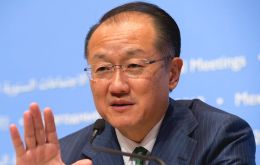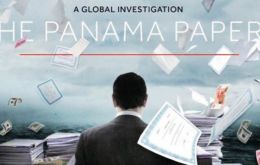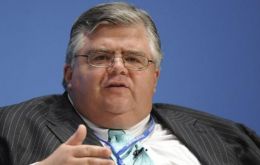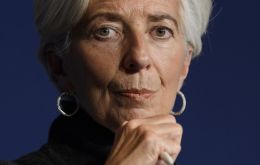MercoPress. South Atlantic News Agency
Tag: World Bank
-
Wednesday, January 10th 2018 - 09:57 UTC
Great recession almost over, “but no time for complacency”, warns World Bank

The World Bank forecasts global economic growth to edge up to 3.1% in 2018 after a much stronger-than-expected 2017, as the recovery in investment, manufacturing, and trade continues, and as commodity-exporting developing economies benefit from firming commodity prices.
-
Monday, December 18th 2017 - 13:47 UTC
Half of the world population without health services, says WHO/World Bank report

At least half of the world’s population cannot obtain essential health services, according to a new report from the World Bank and WHO. And each year, large numbers of households are being pushed into poverty because they must pay for health care out of their own pockets.
-
Wednesday, November 8th 2017 - 09:59 UTC
An estimated third of the Brazilian population live below the poverty line

A new system implemented by the World Bank to measure the number of people who live below the poverty line has meant that in Brazil the number has risen from 8.9 million to 45.5 million, which is almost a third of the population.
-
Wednesday, October 11th 2017 - 14:27 UTC
World Bank admits millions of jobs will be automated and urges investments in “human capital”

The world is on a “crash course” as people's hopes collide with a future in which millions of jobs are automated, the World Bank chief has said. Jim Yong Kim said policymakers should take action by investing in education and health. The World Bank president spoke in New York ahead of the group's annual meeting in Washington DC this week.
-
Wednesday, April 19th 2017 - 21:12 UTC
World Bank praise for Latam countries pursuing counter-cyclical fiscal policies

In a positive development, today more than ever before, Latin American and Caribbean countries are pursuing counter-cyclical fiscal policies - spending more in bad times and saving in good times, according to a new World Bank semiannual report for the region.
-
Tuesday, November 8th 2016 - 06:48 UTC
BA Governor Vidal, World Bank agree to finance Salado River works

María Eugenia Vidal, governor of the province of Buenos Aires, reached an agreement with the World Bank for a 380-million-dollars loan to finance infrastructure works that would be beneficial to more than sixty municipalities. Bidding to start in March.
-
Friday, June 10th 2016 - 08:08 UTC
World Bank slashes global growth forecast to 2.4%, down from 2.9%

The World Bank has slashed its 2016 global growth forecast to 2.4% from the 2.9% estimated in January, due to stubbornly low commodity prices, sluggish demand in advanced economies, weak trade and diminishing capital flows.
-
Sunday, April 24th 2016 - 08:26 UTC
International major effort to cooperate on tax issues and halt evasion and elusion

The International Monetary Fund and the World Bank are joining forces with other international organizations to cooperate on tax issues and develop new tools and standards to halt tax base erosion and evasion.
-
Monday, April 18th 2016 - 08:06 UTC
Praise for Argentina from IMF and credit rating agencies but austerity measures “are tough”

Following President Mauricio Macri’s economic policies and the deal with the holdout funds, Argentina will help to bring stability and a larger economic growth to Latin America, now facing a declining economy mainly because of Brazil’s downfall, representatives from the International Monetary Fund said.
-
Friday, April 15th 2016 - 05:22 UTC
IMF and World Bank target Brexit: 'the most serious downside risk' for the global economy

A British exit from the European Union would pose “serious downside risks” to an already slowing global economy, the head of the International Monetary Fund said on Thursday.
